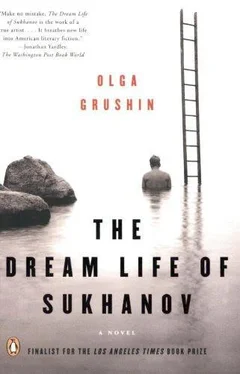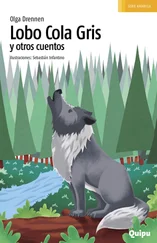“Guess what I have inside my head?” the character whispered with a conspiratorial wink.
Sukhanov surveyed the man’s gleaming eyes, shaved head, inflamed cheeks, gapped yellow grin, and the stained salmon-colored scarf wrapped around his neck, then turned away in prohibitive silence.
“What, too proud to talk to me?” the man said accusingly behind his back, louder this time. “Why don’t you answer my question? What do I have inside my head?”
A nearby couple looked up with curiosity. Wincing, Sukhanov turned back.
“I have not the slightest idea,” he said in an icy tone.
The man roared in drunken triumph. “No one ever guesses!” he bellowed right into Sukhanov’s face. Surprisingly, there was no alcohol on his breath. “But I like you, so I’ll tell you anyway. I have an inflated balloon inside my head, that’s what I have, yeah, and it feels great! Of course, you’re probably just as ungrateful as the rest of them, but I sense great affinity between us, so I’m going to tell you how I did it.”
Sukhanov regarded the man with loathing—and then a solution occurred to him, so simple and mischievous he almost laughed with the malicious pleasure of a boy.
“Why don’t you go and tell that lady over there instead?” he said quietly, nodding at the stern schoolteacher who was still feeding her pigeons. “I’m sure she’ll be happy to know.”
The madman swung around and studied the woman, chewing thoughtfully at one end of his scarf. After a long minute he broke into an ecstatic smile, heaved himself up, and murmuring under his breath, headed toward her with the unsteady jerks of a cotton doll. On reaching the gray sea of birds that spilled away from her bench in shifting, cooing waves, he appeared briefly confounded, then raised his arms high over his head, yelled something, and plunged forward stumbling. The woman shrieked, and a hundred pigeons took off at once, tearing the air, erasing the trees and the roofs, obliterating even the confidently smirking, striding Gogol—and forgetting everything else, Sukhanov stared, stared at their flight, stared at their wings….
The birds flew in rustling, sparkling, ever-widening circles above his head, their hundreds of wings lifting and falling in reverberant staccato, glowing with rosy translucence against the sunset—and when, after many pounding heartbeats, they began to descend to the ground, one after another, like so many falling petals, he saw a different statue revealed in the same place. This too is a Gogol, but one sitting heavily slumped forward, an ill, lonely, heartbroken man—the very same Gogol, indeed, whose mournful aspect will be eventually declared to “misrepresent Soviet reality” and who will then, in the year 1952, be removed, replaced, abandoned in some unfrequented nook of the city. And here, barely reaching the sad man’s feet on the pedestal, I stand with my head tipped back—a three-year-old who has just chased a flock of pigeons and is now watching their circling flight in open-mouthed fascination. Yes, I demand to be brought here day after day for this very reason, for I never tire of the excitement of breaking into a sudden run and startling these wonderful creatures with their puffed-up chests and iridescent throats and hoarse calls, setting them aflutter again and again, and then breathlessly staring after them, trying to catch the precise, brilliant moment when the sun bursts goldenly through the chinks in their flapping wings—until one day a face, a man’s face, a giant’s face with laughing eyes the color of pigeons’ wings, materializes out of the birds’ flickering and fluttering. The face moves closer and closer, until it is level with mine, and then I hear a voice—a voice that I somehow know already, a voice I have always known.
“So you like birds, Tolya, do you? Come then, I want to show you something.”
My hand timidly finds its way into the giant’s hand, and we walk—walk along the tree-lined Gogolevsky Boulevard, past kiosks selling tepid lemonade, past noisy children climbing a wooden mushroom that I find boring, past yellow-and-white mansions flecked with the sun, then through low gates of cast iron, and up an imposing marble staircase—and finally I stand in a long hall with dimness in the corners, and high above me, almost touching the ceiling, revealed in a majestic sweep of light, trembles an enormous creature with dark metal veins running through its spreading, transparent wings.
“An inventor made this,” the giant tells me. “These are artificial wings for a man, you see, so he can put them on and fly. Would you like to fly, Tolya?”
I imagine myself rising, rising with the beautiful, graceful creatures over that unhappy man of stone, spiraling higher into the glowing sky, and, overwhelmed, I nod quickly, repeatedly, and my eyes must be shining, because the man who is with me smiles at me—but already I see that the creature under the ceiling looks clumsy, gigantic, unyielding, not at all like the birds I know, and my certainty wavers.
“I don’t like it, it’s ugly,” I say disappointedly. The man laughs and ruffles my hair and takes me away; and as we walk outside, into the noise and the sunlight and the smells of hot pastries, he says to me, “This flying machine is an important step toward the dream, Tolya, but it’s not the dream itself. You are right, man hopes to fly without any machines one day, soaring up and up with his will alone, free as a bird—and that day, if it ever comes, will be humanity’s most glorious triumph.”
“When I grow up, I want to fly without machines,” I tell him, and as I look up, I see the most brilliant smile trembling under the mustache on his joyful, his dear face, seconds before the street, the light, the man himself begin to fade out like the last scene in a silent film….
His eyes closed, Anatoly Pavlovich sat on the bench, taking shallow breaths, feeling as if a flock of birds had just traveled singing through his mind. In what murky subliminal cavern had it been lying dormant all these years, this priceless burst of a memory, only to yield itself in all its vivid colors at the lightest touch of fate? True, a factual basis for the discovery had been there for a long while. Once, in his reading, he had chanced across a curious tidbit about Vladimir Tatlin, an avant-garde artist who in middle age had become obsessed with flight and had spent years building models, and whose flying glider had been exhibited in 1932 at the State Museum of Fine Arts, now the Pushkin Museum, not ten minutes away from here. Sukhanov had carried that irrelevant scrap of information with him for many years, probably because the glider’s name, Letatlin, had amused him with its ingenious merger of inventor and invention, of Tatlin and letat‘, “to fly”; yet it had remained only a piece of textbook knowledge—until now, when a lucky convergence of words, shades, and gestures succeeded in tearing one magically prolonged glimpse of the past from the steely grip of oblivion and ensconcing it in his soul, quivering and alive.
Naturally, he did not doubt that the vision was faulty in places and that his later knowledge superimposed itself now and again over the lacunae of memory. For one thing, the man of his recollection sported a mustache, looking, in fact, exactly like the dashing suitor offering a bouquet of roses in a black-and-white photograph over Nadezhda Sergeevna’s bed; and even though his mother had told him that Pavel Sukhanov had shaved his mustache once and for all on the day of their wedding, the face bending over him stubbornly refused to shed it. And of course, he did not really believe he had succeeded in reproducing his father’s actual words, for the phrasing was suspiciously sophisticated and would not have been understood, much less remembered, by a three-year-old. All the same, he knew the essence of the encounter had been captured. Tatlin’s glider rose in his mind’s eye with perfect clarity, the general meaning of the conversation was intact—and most important, he was sure, absolutely sure, of the wonderful smile that had lit up the man’s face when the little boy had said, “I want to fly.”
Читать дальше








![Theresa Cheung - The Dream Dictionary from A to Z [Revised edition] - The Ultimate A–Z to Interpret the Secrets of Your Dreams](/books/692092/theresa-cheung-the-dream-dictionary-from-a-to-z-r-thumb.webp)



